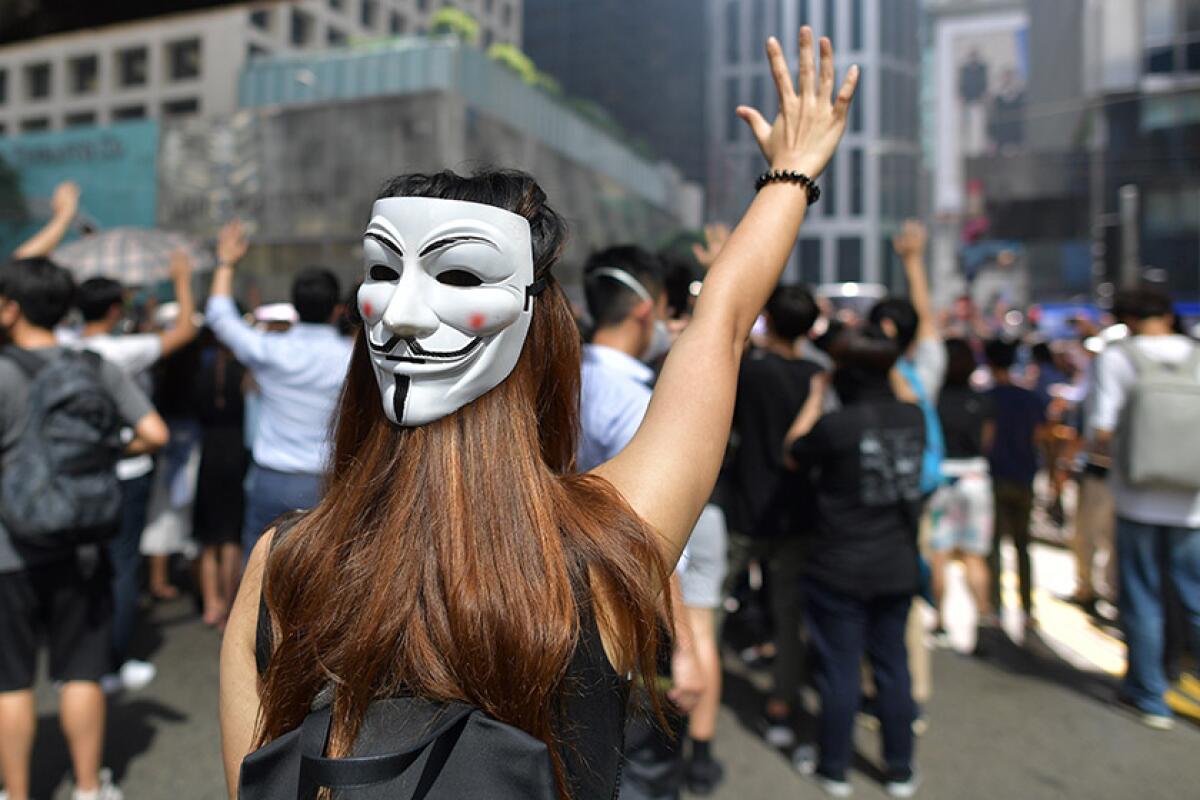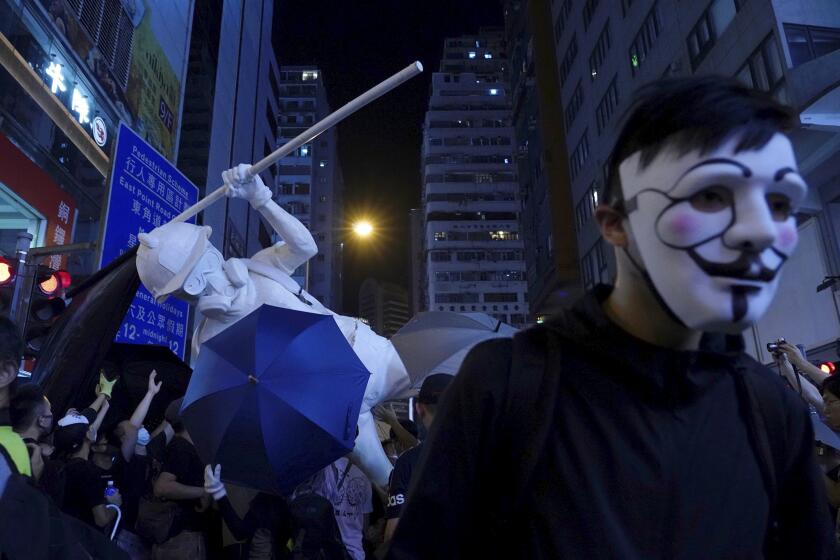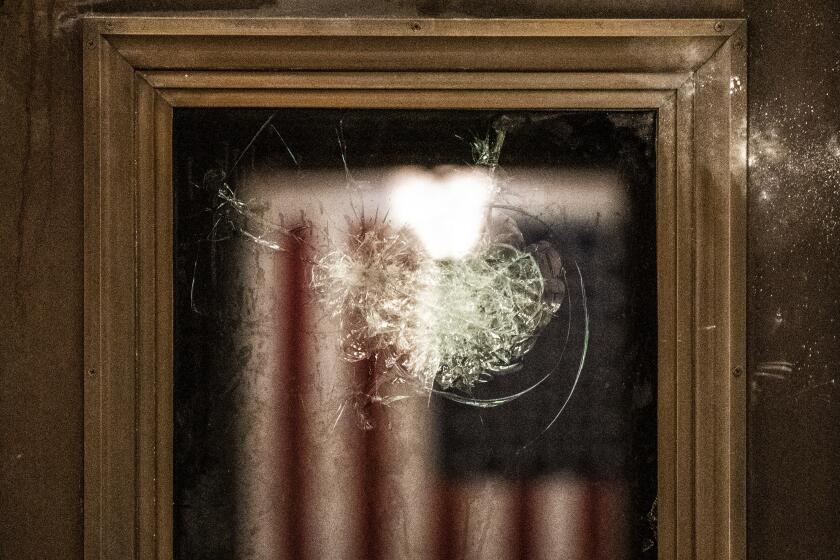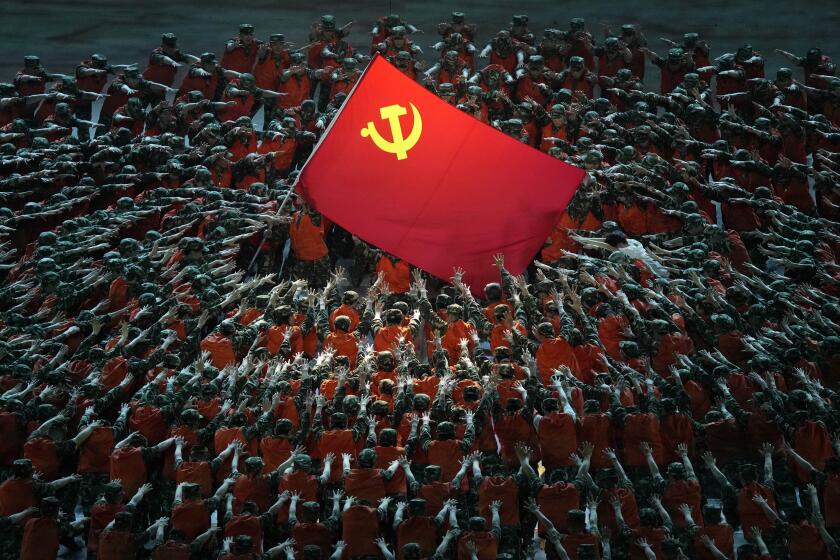Column: Democracy is dying in Hong Kong. But why should the rest of us care?

- Share via
Can democracy be snuffed out? You bet it can. Just look at what’s happening in Hong Kong.
My last visit there was at the end of 2019, right before the pandemic, during what seems in retrospect to have been the final stand of the pro-democracy movement. In those days, pop-up demonstrations were a regular event, including clashes in the streets between masked activists and police officers.
The Hong Kong government was already cracking down on dissent and increasingly siding with Beijing’s efforts to bring the city under its total control. But independent news organizations still challenged the erosion of democratic freedoms. Opposition politicians spoke out in defense of autonomy and independence.
Everywhere there were signs of debate, dissent and resistance: detritus from the previous night’s protests, peeling wall posters and angry anti-government graffiti.
But those days are over.
Opinion Columnist
Nicholas Goldberg
Nicholas Goldberg served 11 years as editor of the editorial page and is a former editor of the Op-Ed page and Sunday Opinion section.
The protests have been beaten back. More than 100 pro-democracy leaders and activists have been charged under the draconian national security law imposed in June 2020. Thousands of demonstrators have been arrested as well; the charges include subversion and separatism.
Government is being purged of critics. In 2021, Hong Kong and Chinese authorities demanded that elected officials and candidates for office pledge their loyalty not just to Hong Kong and its laws, but to Beijing as well. Hundreds of members of Hong Kong’s district councils resigned or were removed from office. Even those who swore fealty were removed if the authorities didn’t find their pledges credible.
The repression of the independent media has been intense — and successful. In the final week of December, Stand News, an independent pro-democracy website, was raided by hundreds of police officers; seven editors, board members and a journalist were arrested and the organization said the site would be taken down. A few days later, on Jan. 3, Citizen News, a small online news site, said it too would stop publishing due to fears for the safety of its staff.
They were among the last remaining independent voices in the city. Their closure followed the shutdown in June of the feisty, independent tabloid Apple Daily, owned by clothing tycoon Jimmy Lai, who is now in prison.
A year after China imposed its repressive National Security Law on Hong Kong, the chances of citizens’ winning back their freedoms are slim.
The teachers union and the city’s largest independent trade union were disbanded in 2021, as was the Civil Human Rights Front, which had organized some of the biggest pro-democracy demonstrations.
Police and courts have become “tools of Chinese state control rather than independent and impartial enforcers of the rule of law,” said Human Rights Watch in June. Since my visit, academic freedom has been threatened, museums harassed, films canceled, monuments removed, political slogans banned and books removed from libraries.
Hong Kong Chief Executive Carrie Lam is now merely a functionary of the government in Beijing.
This is how democracies disappear. Without leaders who dare to speak out, without venues to publish or broadcast independent news, without recourse to an independent judicial system, without basic rights and liberties guaranteed and protected by the government, there’s no way for the people of Hong Kong to stand firm against the encroaching overlords from the mainland.
What is required on the anniversary of Jan. 6 is nothing less than a national awakening.
Their subjugation is terribly depressing to watch.
The city was under British colonial rule for more than 150 years, until 1997, when the United Kingdom handed it over to China. At that time, the Chinese government agreed to allow a significant measure of political autonomy and personal freedom for 50 years under a framework known as “one country, two systems.”
But that promise has been broken.
The United States government decries the situation, of course. After Stand News was shut down two weeks ago, Secretary of State Antony Blinken said “Journalism is not sedition…. A confident government that is unafraid of the truth embraces a free press.”
But what is the U.S. prepared to do about it? There’s a limit to how much pressure the American government will put on a mighty superpower like China to protect the people of Hong Kong. Hong Kong matters more to China than it does to us.
If nothing else, what’s occurring in Hong Kong is a reminder that democracy is fragile. That’s something we should take to heart.
There was a period just after the Cold War ended when some people believed the forward march of democracy had become irreversible, that the collapse of dictatorships was inevitable, that the liberal democratic order had triumphed over totalitarianism and despotism. In the early 2000s, the number of free and democratic countries grew dramatically, by all sorts of measures.
A century into the Chinese Communist Party’s rule, we traveled across China to explore parts of its told and untold history.
But in recent years, democracy has been in retreat. The Economist’s “Democracy Index” for 2020, for instance, found that thanks to “democratic backsliding,” only 8.4% of the world’s people were now living in what could be considered full democracy. The index’s “global democracy score” was lower than its been since it was created in 2006.
Backsliding has occurred here at home, too. The Economist now classifies the U.S. as a flawed democracy. And in March of last year, the U.S. fell to a new low in an annual global ranking of political rights and civil liberties by Freedom House, earning 83 out of 100 points, down from 94 a decade earlier.
So we can’t be complacent. Democracy, the rule of law, civil rights and individual liberties matter — and they are in jeopardy, at home and abroad. The people of Hong Kong are sending us a poignant message: If you live in a democratic system, savor it and celebrate it — and fight for its survival.
More to Read
A cure for the common opinion
Get thought-provoking perspectives with our weekly newsletter.
You may occasionally receive promotional content from the Los Angeles Times.















